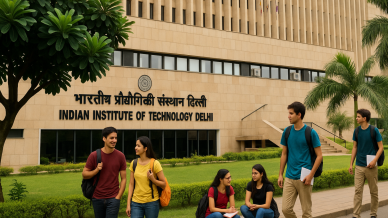IIT-Delhi introduces major changes across UG, PG, PhD programmes from 2025-26: Here’s what is new
The curriculum renewal, part of IIT Delhi’s periodic review, is conducted roughly every decade, and is aimed at creating greater academic flexibility and enhanced industry relevance. According to the official notice, the changes are based on feedback from thousands of students, alumni, and industry experts.

IIT Delhi new curriculum 2025-26: The Indian Institute of Technology (IIT) Delhi has announced a major curriculum overhaul, its first in over a decade. The institute announced that a comprehensive revamp of its entire academic structure across Undergraduate (UG), Postgraduate (PG), and PhD programmes has been made.
monthly limit of free stories.
with an Express account.
The revised structure, a result of an extensive review that began in early 2022, will be implemented from the academic year 2025-26, according to a statement by IIT Delhi.
IIT Delhi new curriculum 2025-26: What’s new in the UG programmes?
At the undergraduate level, the new curriculum introduces greater academic flexibility, hands-on learning, and emphasis on 21st-century skillsets. The overall structure will now be outcomes-based, providing students with the ability to customise their academic journeys through elective options across engineering, sciences, and humanities. Here’s an overview of the changes:
JEE Advanced 2025 Result Date and Time Announced
Honours and dual degree options: Introduction of an Honours add-on to the BTech and an option for students to petition for an integrated BTech + MTech degree at the end of the third year, enabling graduation with both degrees in five years.
Programme change flexibility retained: Students admitted through JEE (Advanced) can still change their academic programme based on first-year performance, a popular policy that continues.
Early departmental exposure: Students will begin engaging with their departments in the first year itself, fostering early immersion into their disciplines.
Small class sizes for first-year courses: This is expected to develop deeper faculty-student interaction.
Hands-on and ethical learning: Enhanced lab/tutorial components and integrated modules on environment, sustainability, creative expression, and ethical reasoning.
AI-integrated programming education: A standout innovation is the incorporation of AI-based code generators in the introductory programming course. Students will learn to use AI tools responsibly, enabling them to tackle complex problems efficiently and preparing them for a rapidly changing tech landscape.
Flexible core and credit reduction: A reduction in total credit load with a more focused core, enabling students to take electives and pursue minor degrees or honours programmes more easily.
IIT Delhi new curriculum 2025-26: Three new courses will be offered
The institute has announced that from the 2025-26 academic session, three new academic programmes will be offered:
–BTech in Design: Entry via JEE (Advanced) and UCEED qualification.
–BS in Chemistry: Entry via JEE (Advanced); this is IIT Delhi’s first standalone BS programme.
–MTech in Photonics: Entry via GATE or equivalent qualification.
IIT Delhi new curriculum 2025-26: Changes in PG (MTech/MSR) curriculum
The MTech and MS (Research) programmes have also been realigned with an outcomes-based framework focused on real-world applicability. Major changes include:
Capstone project and summer internship: Two compulsory components aimed at enhancing problem-solving and establishing industry connect.
Increased flexibility: Students can take interdisciplinary courses and even complete their master’s thesis within an industry setting.
PhD conversion option: Provision for students in M.Tech/MSR to convert to a PhD mid-way, enabling a smoother transition to research careers.
Programme consolidation: Some departments have merged their M.Tech programmes for curricular coherence and streamlined offerings.
IIT Delhi new curriculum 2025-26: Changes in PhD course-work
The PhD curriculum at IIT Delhi has been restructured to enhance independent research capabilities, promote the ethical application of knowledge, and strengthen collaborative and transferable skills. It also places a strong emphasis on fostering external and industry connections.
Why have these changes been introduced by IIT Delhi?
The curriculum renewal, part of IIT Delhi’s periodic review, is conducted roughly every decade, and is aimed at creating greater academic flexibility and enhanced industry relevance. According to the official notice, the changes are based on feedback from thousands of students, alumni, and industry experts, with each department conducting deep consultations to tailor its programme-level reforms.
In a statement, IIT Delhi Director Prof Rangan Banerjee summed up the reform’s objective, saying, “We have reviewed and revamped our curriculum to make our graduates future ready. The new curriculum has emerged after extensive stakeholders’ feedback and provides flexibility and hands-on learning for our students.”